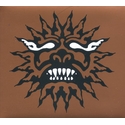
Sol Invictus
Sol Veritas Lux
Tursa/Strange Fortune
Sol Invictus (“the unconquered sun”) is one of the many musical outlets of one Tony Wakeford, an impossibly influential and hence unknown British musician, at one time or another involved in the evolution of groups like Death in June, Nurse With Wound, Above the Ruins, Current 93, Crisis and Orchestra Noir, along with an ever-evolving constellation of collaborators and confederates. It is his primary and most long-running outfit, Sol Invictus, that we are here concerned with, whose melancholy, poetic, and chillingly stark debut Against the Modern World set into motion seismic changes in Gothic/industrial music and, much more importantly, the neo-folk movement that continues to gain traction and converts. It was Wakeford who was largely responsible for bringing darker and more psychedelic soundscapes to the folk model. Wakeford’s own label, Tursa, has repackaged and reissued two early Sol Invictus records together (the aformentioned Against… and In the Jaws of the Serpent) into one fucking stellar package.
Even at the beginnings, Sol Invictus had perfected their sonic template – one that was delicate and minimal, the sound of malcontents and outcasts resolutely turning their backs on noise and rock convention to weave an altogether more otherworldly sound. Songs are brief and mysterious, often disregarding choruses to become quickly unspooling threads of dissent and saddened disgust. Brittle guitar-strummed staccato, ghostly, heavily echoed vocals delivered in a heavy working class British accent in a voice that’s somewhere between Julian Cope and Ian Curtis and Oliver Cromwell form the core of Sol Invictus’ sound. Profoundly dark and incisive lyrics tap into the blacker recesses of the 20th century mindset of a war and pop-culture obsessed modern culture – sentiments that would not be out of place today, indeed even more prescient. The recording is as austere as the performances and thematics, making it all the more difficult to pinpoint in a pop cultural timeline.
Sol Veritas Lux starts out like a cold wind blowing in from the English Channel with the painful monochrome of “Angels Fall,” resounding like a series of painful whip cracks. Can you imagine how this must have sounded upon its initial release years ago? The seminal “Raven Chorus” starts out like a traditional à capella folk lament (with more than a few hints of Richard Thompson/Fairport Convention) before expanding into a hungry stygian maw of primitive sonics – droning guitar and cello clash with martial percussion and Wakeford’s quavery no-quarter-given bellow. Wakeford seems almost too disgusted to sing the lyrics of his vitriolic lament “Against the Modern World,” a deceptively lulling attack against capitalist Western society. The performance is anxious and rushed, which only adds even more beautiful tension. Bell-like and buzzing synths add the first hint of modernity to this album in the bizarrely upbeat “Long Live Death,” insistent drum machine and acoustic guitar pinging and violins/cellos droning away during the brief respites that come between verses delivered by Wakeford with an Ian Curtis-like baritone. The crystalline backing vocal harmonies on “A Ship Is Burning” are a thing of delicate beauty, even softening Wakeford’s strident monochord strums and gruffly accented lyrics. “Untitled” is more ancient rite than pop song. The brutalist chamber-goth of “Summer Ends” is enshrined in slowly warping waves of sound and grey noise, with the synthesized handclap and drum machine intrusions and scraping string section toward the end giving it a seasick Velvet Underground feel. Wakeford makes the lyric “she dreams” sound like an epithet. Rudimentary vocal loops give “Wolf Age Axe Age” an even more paranoid and disoriented feel – again, more of a rite meant to cleanse decadent modern influence rather than futurist sampling, each voice recanting a more dire prophecy than the last over churning musical tension.
Next up is In the Jaws of the Serpent a document of a 1988 set recorded in Tokyo, Japan. The performance is mordant and authoritarian in equal measure, sounding like it’s being played in a bombed-out bunker or an abandoned church. The silence that rushes in to fill the long spaces between notes and the minimal soundscapes is almost as tense as the tightrope music itself. The show finds a dour and yet at the peak of their power Sol Invictus playing the whole of Against the Modern World alongside equally depressing numbers like “World It Ends” and “Gold is King.” It’s interesting to contrast recorded performances with live renditions. The ceremonial (almost tribal) drumming takes more of a center stage, sounding like vast tattoos signaling a march or portentous arrival, alongside crystalline rudimentary guitar chords, the bass, almost completely absent from Against…, is here a vast abyss, grinding and distorted, and the synth, in contrast to the album’s brute lushness, is now high-strung and brittle, reminding one of Bernard Sumner’s work in Joy Division (check out the tar pit bubbling in “Gold is King” or the waves of light in “Abattoirs of Love”). The songs seem more vast and cinematic live, yet also more fragile and irretrievably in the moment. “The Runes” for instance, regurgitates the history of 20th century warfare as one vast graveyard of distrust; Wakeford’s voice sounds in turns gentle (“and this is where the crosses grow”) and spiteful (“the new fashion/is a shroud”).
After that, it’s just the proto-industrial Cabaret Voltaire instrumental rave-up of “Joy to the World” and new bonus tracks! Re-re-recordings of “Angels Fall” and “Against the Modern World” from 2006 find Sol Invictus not having lost a mystic step, while more subtly orchestrated (but not in a bad way, trust me). Wakeford’s voice has aged gorgeously.
The entire package is amazing. A digipack with one of the inlays displaying the classic shot of the definitive Invictus lineup, shrouded in shadow standing on an empty beach (take that Echo and the Bunnymen) and the other inlay with a gaudy color photo of a scowling Wakeford, clearly unhappy in Japan. Included also is a booklet packed with photographs and lyrics. This is how it should be done.
Tursa Records: http://www.tursa.com












